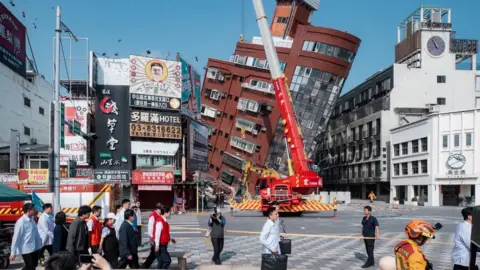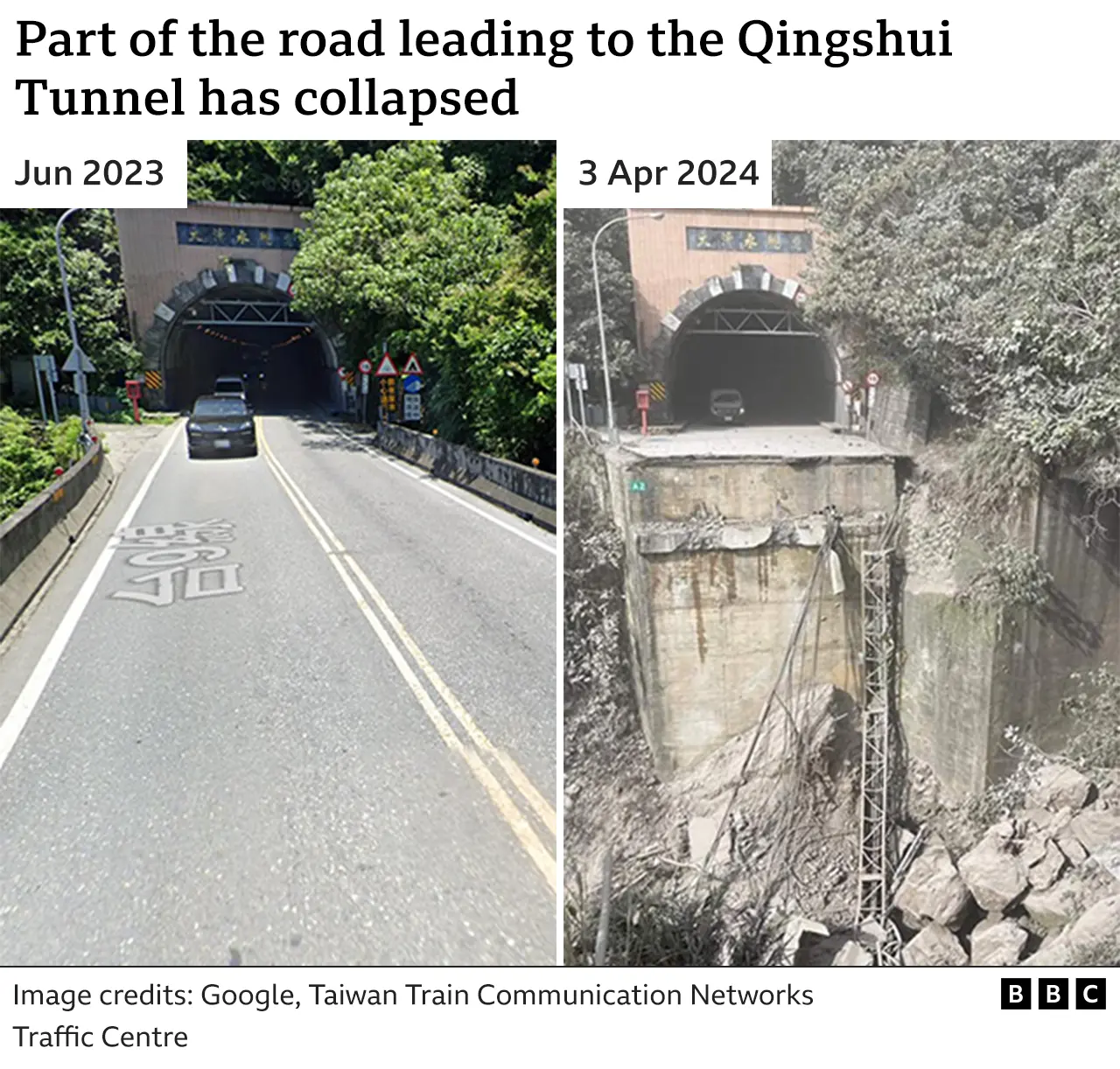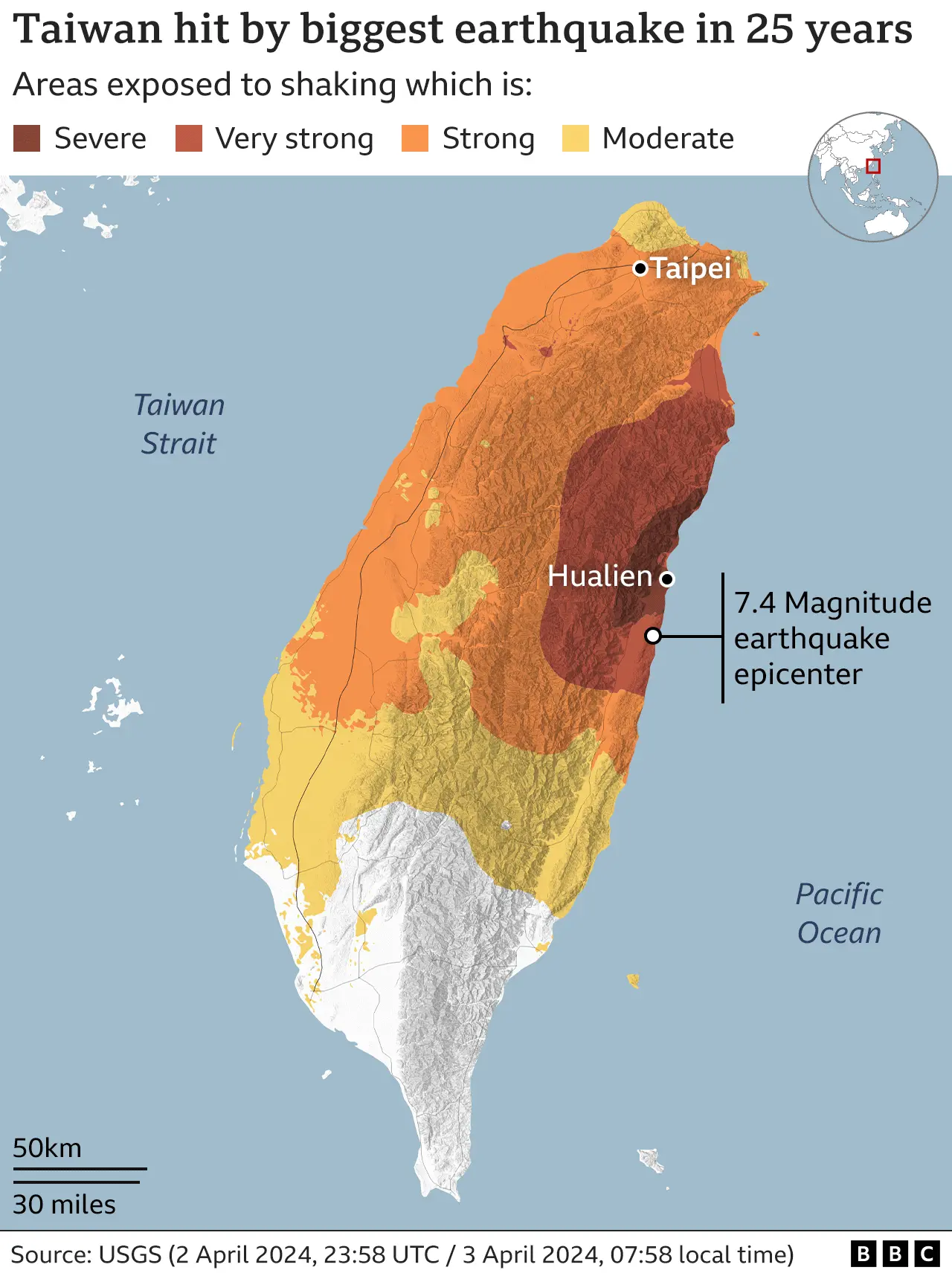Rescuers in Taiwan are working to reach more than 600 stranded people, a day after the island experienced its worst earthquake in 25 years.
One survivor has recounted how tremors unleashed rockslides “like bullets” around the coal mine he was working at.
The 7.4 magnitude earthquake hit near the eastern county of Hualien, killing nine and injuring more than 1,000.
Some stuck in tunnels and near a national park have been rescued by helicopters, but 34 are still missing.
The official number of people trapped or stranded rose considerably – from about 100 to 663 – on Thursday as people started getting phone signal back in the mountainous regions.
Most are not believed to be in danger but are stuck due to roads being cut off. Officials are now trying to work out the best way to get them out.
Food supplies have been air-dropped to dozens trapped in these areas, local reports say.
“The mountain started raining rocks like bullets, we had nowhere to escape to, everyone ran beside the sandbags for cover,” the survivor, identified by his surname Chu, told Taiwan’s Central News Agency.
Three of the nine who died were hikers on a trail leading towards Taroko National Park, named after a landmark gorge, just outside Hualien.
In Hualien city, the capital of the county where the earthquake struck, relief efforts are proceeding quickly, with workers using excavators and other heavy equipment to demolish several damaged buildings.
On Thursday morning, the BBC also witnessed relief workers removing huge boulders – the size of cars – that had fallen close to railway lines so as to get normal train services running again.
They are also using large amounts of gravel and rocks to shore up a 10-storey structure known as the Uranus building, which has been leaning downwards since the quake struck – to prevent it from falling over in case of another aftershock.
Local reports said one female teacher had died in the building when she returned to rescue her cat.
 The red brick Uranus building is seen leaning precariously
The red brick Uranus building is seen leaning precariously
Hsu Chiu-yueh, who was working opposite the Uranus building when it collapsed, told the BBC: “It was so shaky I could barely walk. I was really scared. I felt my legs were not in control anymore. Thanks to my colleagues, they dragged me so we could get out.”
“There was a lot of dust coming into our building on our way out… We [later] realised that it came from the building across the street that had partially collapsed,” said the 50-year-old.
Another Hualien resident recounted how the quake threw her home into disarray.
“I was just getting out of bed when a clothes rack and a low cabinet fell over,” Ocean Tsai told BBC Chinese.
“It kept getting stronger, and I started worrying about our belongings at home. Fortunately, apart from the motorcycle tipping over, the damage was minimal.”
The earthquake, which struck 18km (11mi) south of Hualien, was followed by more than 200 aftershocks, dozens of which were at least 6.5 magnitude or more, hindering search and rescue efforts. Taiwanese authorities expect there to be more aftershocks in the next few days.
Pictures show how the road outside Hualien’s Qingshui tunnel – one of many winding roads that run along Hualien’s rocky coastline – had simply fallen away.
Routes like Qingshui are popular among tourists because of their spectacular views from the mountains out across the Pacific Ocean. But they are also known to be treacherous, not least because of the possibility of landslides.

Further north, the capital Taipei was also shaken violently with footage showing damaged buildings and people being evacuated. Local TV stations aired clips of smashed vehicles and stores in disarray.
“The earthquake is close to land and it’s shallow. It’s felt all over Taiwan and offshore islands… It’s the strongest in 25 years,” Wu Chien Fu, the director of Taipei’s Seismology Centre said on Wednesday.
Power cuts and internet outages were reported across the island.

The earthquake also triggered tsunami alerts earlier in the day on Wednesday in nearby Japanese and Philippine islands, but these alerts were later downgraded.
While Taiwan has a history of quakes, both locals and foreigners who have lived in Taipei for years say this is the strongest quake they have experienced in decades.
The last major quake at 7.6 magnitude hit in September 1999, killing 2,400 people and destroying 5,000 buildings.
Additional reporting by Fan Wang in Singapore and BBC Chinese’s Tzu-Wei Liu in Taipei
Stay informed with The Namibian – your source for credible journalism. Get in-depth reporting and opinions for
only N$85 a month. Invest in journalism, invest in democracy –
Subscribe Now!






